
Co-founder, heritage group of schools
An alumnus of the globally renowned Harvard Graduate School of Education, Manit Jain, co-founder of the Heritage Group of four K-12 schools in Delhi NCR, is a pioneer of experiential learning. In the EW India School Rankings 2019-20, the group’s showpiece Heritage Xperiential Learning School, Gurgaon is ranked India’s #1 co-ed day school. Jain also chairs FICCI’s Alliance for Re-Imagining School Education (ARISE), the private schools advocacy wing of the Delhi-based Federation of Indian Chambers of Commerce and Industry (FICCI).
How have the Heritage Group and FICCI Arise responded to the Covid-19 challenge?
The best learning happens through a combination of online and offline processes. Therefore, having already invested in a robust Learning Management System that stored all curriculum content digitally, we quickly devised a learning continuity plan for our students. virtual classes are conducted with teachers using a combination of asynchronous and synchronous classes through Teamie and Google Hangout apps.
FICCI Arise has also taken various initiatives. Several virtual meets have been organised in collaboration with Google India to support schools to provide distance learning solutions. These meets have been attended by over 500 educators of 200 schools, across 46 cities, 26 states and three countries. Moreover, we have also organised a series of webinars.
What are the major challenges confronting K-12 education in the new Covid-19 era?
The Covid-19 crisis has exposed the inequities of our education system — from lack of Internet access and computers to failure to attract talented graduates to enter the teaching profession. These inequities have been amplified in this time of crisis. However, it has also aroused hope of shaking up the iniquitous status quo when things return to normal.
Several state governments have prohibited private school managements from collecting fees during the lockdown and banned fee increases. What’s your comment?
Non-payment of fees can force educational institutes into ICU, while simultaneously jeopardising the livelihoods of millions of teachers. If school managements experience difficulty in paying the already meagre salaries of teachers, the future of the country will be dim. Education institutions take years to build and once broken, they are difficult to revive. Such populist measures may provide temporary relief to parents, but they will cause permanent damage to education institutions.
What are your Top 3 proposals for reforming K-12 education in India?
Reduce regulations. Too many rules and regulations are discouraging edupreneurs from promoting greenfield institutions. They create competition, and improve the quality of education. Moreover, competition drives down school fees Introduce voucher system. Time for government to start funding students instead of schools Formulate viable and attractive PPP models. Edupreneurs and NGOs should be encouraged to upgrade and transform non-performing government schools Overhaul examination system. To assess children’s learning outcomes, exams should test students’ comprehension skills and socio-emotional learning, rather than memory.
What are your future plans for Heritage schools?
We intend to move towards greater adoption of technology and strengthen our experiential, projects-based curriculum by adding socio-emotional education. We are also exploring the possibility of starting schools in other cities across the country with like-minded local partners.
Also read: Leaders who can revive Indian education – Dr. Nissar Ahmed